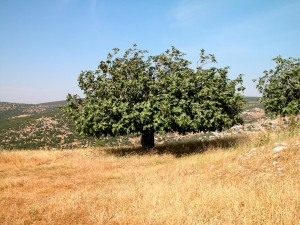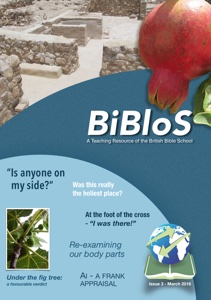First impressions are always the most important. The impression that we form of a person at our first meeting is often the impression that stays with us the longest. John chapter 1 records a series of first impressions that some formed of Jesus the first time they met him. John the baptist identified Jesus as “the Lamb of God who takes away the sin of the world!” (John 1:29). This was the first impression of Jesus given to two of John’s disciples who then started following Jesus. One of those disciples was Andrew. After spending some time with Jesus, Andrew went to find his brother, Simon and said to him, “We have found the Messiah.” Andrew had come to the conclusion that Jesus was the Messiah, and so he wanted to share this good news with his brother. The following day Jesus decided to travel to Galilee when he met Philip and called Philip to follow him. Philip then went to find his friend Nathanael and said to him, “We have found him of whom Moses in the Law and also the prophets wrote, Jesus of Nazareth” (John 1:45). These were the earliest impressions formed by these men who would spend the next three years with Jesus.
“Come and see”
Who was this man Nathanael whom Philip went to find? John is the only writer to record the name “Nathanael.” It is a Hebrew name meaning, ‘Gift of God’ or ‘God has given’. But it is not a name that is included in any of the lists of the twelve disciples recorded in the other Gospels. However, one name that is included in those lists is the name “Bartholomew” and many consider Bartholomew to be the same person whom John calls “Nathanael.” Another possibility is that Nathanael became a disciple of Jesus but was not one of the twelve, for Jesus had other disciples in addition to the twelve. Nathanael makes a second appearance in John 21:2, where he is included in a list of disciples who saw the resurrected Christ by the Sea of Tiberias. There he is called, “Nathanael of Cana in Galilee.” So we know that like Philip, Andrew and Simon, Nathanael was from the region of Galilee, and specifically he was from the town of Cana.
We are not told the circumstances of Jesus’ meeting with Philip, or whether Jesus already knew Philip when he called him to follow him. The first impression that Philip had formed of Jesus was that he was the Messiah, the one who had been spoken of by Moses and the prophets. Philip was acquainted with the scriptures and knew that they spoke of a coming Messiah, one who would bring deliverance to God’s people and establish God’s kingdom and he now believed that Jesus was the fulfilment of those promises. Philip was excited about this discovery and wanted to share this good news with his friend Nathanael. When Philip found Nathanael he said to him, “We have found him of whom Moses in the Law and also the prophets wrote, Jesus of Nazareth, the son of Joseph” (John 1:45). However, Nathanael was not impressed. He asked, “Can anything good come out of Nazareth?” What caught Nathanael’s attention was not that Philip thought he had found the Messiah, but mention of the town of Nazareth. As far as Nathanael was concerned, nothing good could come from a place like Nazareth. It was a small, insignificant town, not renowned for anything great. Surely the Messiah, the one spoken of by Moses and the prophets, would not come from such a place.
Philip responded to Nathanael’s scepticism by inviting him to, “Come and see.” This was the best way to deal with Nathanael’s prejudice. Philip did not seek to get into an argument with Nathanael, he did not try to persuade him that he was wrong and something good could come from Nazareth. He simply invited him to “Come and see” for himself. He could then make up his own mind about Jesus. Today when we seek to speak to people about Jesus we may often get a negative reaction. The best way for us to handle such responses is to do the same as Philip did – invite people to come and see or investigate matters for themselves. We cannot argue people into having faith in Jesus and winning debates won’t necessarily bring people to Christ. It is not clever arguments that will convince people, but simply telling others what Jesus means to us. People must be able to see that Jesus has made a difference to our own lives before they will be willing to come and see for themselves.
“An Israelite indeed, in whom is no deceit!”
Despite his doubts and presumptions about Nazareth, Nathanael was willing to accept Philip’s invitation to come and see Jesus. Jesus saw Nathanael coming towards him and said, “Behold, an Israelite indeed, in whom is no deceit!” In this statement Jesus assesses and commends the character of Nathanael. There was no deceit, fraud or treachery in Nathanael. He is a genuine Israelite, a descendant of Jacob who fears and obeys God. This was what Jesus saw in Nathanael. Perhaps Jesus was drawing a contrast between the character of Nathanael and the character of his forefather Jacob. Jacob was a man who was renowned for his guile. After Jacob had tricked his brother Esau out of his blessing Isaac said to Esau, “Your brother came deceitfully, and he has taken away your blessing.” Esau replied, “Is he not rightly named Jacob? For he has cheated me these two times. He took away my birthright, and behold, now he has taken away my blessing” (Genesis 27:35-36). It was only later, when he stopped using deceit, that God changed Jacob’s name to “Israel.” But Nathanael was an Israelite, a descendant of Jacob, in whom there was no trace of deceit.
Taken aback by this favourable estimation of his character Nathanael asked, “How do you know me?” Nathanael had never met Jesus before, so how could he have formed an opinion about him so quickly? Jesus answered, “Before Philip called you, when you were under the fig tree, I saw you” (John 1:48). In Jewish thought the idea of sitting under a fig tree was an image of peace and security. 1 Kings 4:25 pictures the peaceful conditions of Solomon’s reign, “And Judah and Israel dwelt in safety, from Dan even to Beersheba, every man under his vine and under his fig tree, all the days of Solomon.” A man could sit under his fig tree, undisturbed and untroubled, praying and meditating upon God’s word.
When Jesus said, “Before Philip called you, when you were under the fig tree, I saw you,” Nathanael’s reaction indicates that there is more to this than Jesus simply seeing Nathanael sitting under a fig tree. Nathanael exclaimed, “Rabbi, you are the Son of God! You are the King of Israel!” (John 1:49). There was something in those words of Jesus that had a tremendous impact upon Nathanael. It is not just that Jesus saw him sitting under a fig tree that caused Nathanael to proclaim him to be the Son of God and the King of Israel. It may be that when Nathanael heard these words he recognised that Jesus possessed a clear insight into the things that Nathanael was thinking about under the fig tree. It is Jesus’ intimate knowledge of the thoughts and meditations of Nathanael’s heart that produced this reaction. Nathanael realised that Jesus had seen into the depths of his heart and Nathanael concluded that Jesus must be the Son of God and the King of Israel. By using these titles Nathanael expressed his conviction that Jesus is the Messiah.
Jesus now raises Nathanael’s expectations of seeing even greater things, “Because I said to you, I saw you under the fig tree, do you believe? You shall see greater things than these” (John 1:50). Here is a promise that because of his belief in Jesus as the Messiah Nathanael will be blessed to witness greater evidences of Jesus’ deity and Messiahship. As a disciple of Jesus Nathanael must have witnessed many of the miracles that Jesus performed, and then the greatest thing would have been to witness the appearance of the resurrected Christ. Jesus tells Nathanael what he will see, “Truly, truly, I say to you, you will see heaven opened, and the angels of God ascending and descending upon the Son of man” (John 1:51). Jesus seems to be referring to the incident from Jacob’s life, recorded in Genesis 28:10-17, when Jacob had a dream in which he saw a stairway stretching from earth to heaven and the angels of God ascending and descending on that stairway. Jesus suggests to Nathanael that he is that stairway between heaven and earth. The thought of the angels ascending and descending upon the Son of man implies that communion between heaven and earth is established through Jesus Christ; he is that connection or mediator between mankind and God. Nathanael will be privileged to witness these things by becoming a disciple of Jesus.
Nathanael’s first impression that nothing good could come from Nazareth is shown to be a false first impression, for having met Jesus he declared him to be the Son of God, the King of Israel. By accepting Philip’s invitation to “Come and see” Nathanael had come to his own conclusion about Jesus which had led to this expression of faith. In this he is an example to all who are willing to investigate matters for themselves. His response in declaring Jesus to be “the Son of God…the King of Israel” anticipates what the appropriate response to Jesus should be once a person has come into contact with Jesus and seen for themselves.
John Griffiths
This article is from BiBloS, a teaching resource of the British Bible School. To read more articles or download the whole of Issue 3, click here.



